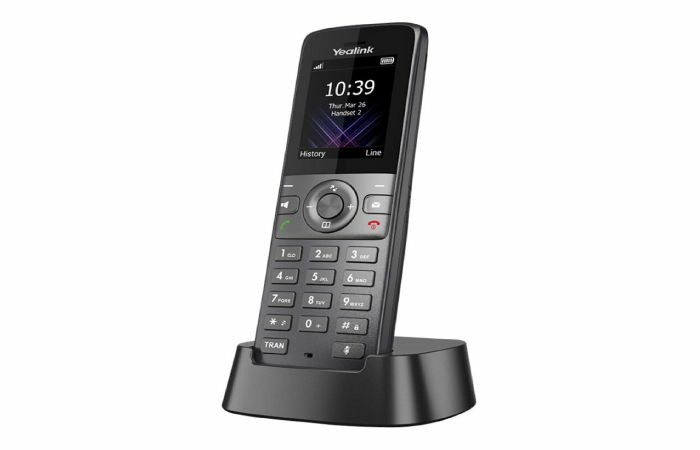Table of Contents
VoIP Phones
When we talk about VoIP phones, we refer to the technology used to make phone calls over the Internet using Voice over IP, which is similar to VoIP, the digital format of traditional telephone audio. By switching to, this way, it gets the ability to be sent using. The Internet, and vice versa, convert the digital audio it accepts into standard telephone audio.
VoIP Phones and their Features
VoIP telephones have many features, and each instance, both physical and virtual, have one or the other part according to the different brands in the IP telephony market. Thus the most common features of VoIP phones are:
- Call transfer
- Call monitoring
- Call recovery
- Call recording
- User identification
- Video conferencing
- SMS Messaging
- Authentication
- Database Integration
- Music on Hold
- Volume Control
- Emergency Calls
- Call Waiting
- Automatic Call Answering
- Caller Block
- Music Creation
- Music Transfer
- Fax reception and transmission
- Web interface to check mail
- Visual notification of voice messages and
- Other less common features
VOIP Phone Features vs. Your Telephone System Features
Before you start with the various functions you may find in VoIP, keep in mind that this is different from the functionality your service provider usually offers you for the system. Some features may require specific hardware devices to function correctly. Your VoIP service provider group may allow video calling, but if your office phone does not have a screen, you cannot take advantage of this feature.
However, having some hardware does not mean using all the features. VoIPis flexible and allows users and system administrators different levels of control over configuration, features, and functionality. Therefore most organizations avoid buying expensive models for employees who do not need them, reducing the system’s total cost.
So consider the example of a sales department office. If most of your salespeople are constantly on the move and rarely in the office, they don’t need a desk phone. Most of them will use it instead of an app on their smartphones and can access most of the features available on the VoIP system you use.

Types of VoIP Phones
As mentioned, VoIP phones have several options to meet companies’ different connection requirements. In most cases, many use them because we may have a physical or virtual device in the office and an application on our mobile.
Fixed Telephone
These are devices similar to traditional telephones, except that they have a screen for talking via video conferencing and can make multiple calls simultaneously and with high-definition sound.
Wireless Phones
These telephones are practical and helpful because you can talk to them without having to be on your computer, even when it twists on, near a designated terminal, or in use. These phones have voice line features similar to a landline phone.
IP Phone / Soft Phone
It is a virtual telephone. It is software that installs on a computer, and through this program, which looks like a traditional phone, you can make calls through the Internet. This type of telephone can be beneficial if you have some headphones, a microphone, and a webcam. This software also works on mobile phones by installing the application on your smartphone.
USB Phones
Therefore these are less ordinary phones, which connect to our computer via a USB port to connect to the Internet, and you can use it. While the main advantage is that you can take it with you everywhere, the fact is that access to smartphones in the community means that they are changed every day by installing applications for the same purpose.
Cisco VoIP Phone
Cisco is one of the world’s most recognized IP telephony brands, and it offers a wide range of products and integrated solutions for the unified communication of companies. Having been Cisco’s partner in Comunycarse for many years, we also have the wonderful experience of effectively implementing the most sophisticated communication infrastructure in the world of VoIP telephony.
Setting Up a VoIP Phone
Setting up a VoIP phone is typically very easy. For hardware VoIP phones, plug the phone into your internet router and follow the instructions on the phone’s display. For software VoIP phones, download and install the software on your computer or smartphone and follow the instructions to create an account and configure your settings.
Using a VoIP Phone
Once your VoIP phone is set up, you can start making and receiving calls like a traditional landline phone. To make a call, enter the number you want to call and press the call button. To respond to a call, press the answer button.
VoIP Phone Security
It’s important to take steps to secure your VoIP phone and your VoIP account. Here are a few tips:
- Use a strong password:Use a strong password for your VoIP account, and don’t reuse it on other websites or services.
- Keep your software up to date:Ensure the software on your VoIP phone and your computer always updates with the latest security patches.
- Use caution while clicking on email links: Scam emails are a common way hackers steal VoIP account passwords. Use caution while clicking on email links, even if they appear from a trusted source.
- Use a firewall:A firewall can aid in protecting your VoIP phone and computer from unauthorized access.
Conclusion
Voice over IP allows considerable savings in terms of local and international call charges compared to traditional phone systems. Most providers also offer unlimited calls to specific countries. Generally, you get what you pay for with IP phones. Advanced models typically have better sound quality, support advanced features, and last longer without causing problems.
Also Read: About Nokia 8800 and Some Different Models
Related posts
Featured Posts
Blue Film Anti-Radiation Reading Glasses
Blue film anti-radiation reading glasses are also known as screen glasses. Anti-blue light glasses are a countless solution to the…
Online Flexbooker Decemberilascubleepingcomputer
Online Flexbooker Decemberilascubleepingcomputer – On December 23, 2022, online appointment scheduling service FlexBooker disclosed a data breach that affected over…


